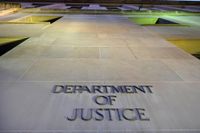The Department of Justice (DOJ) has placed Erez Reuveni, a senior immigration attorney, on indefinite leave following his criticism of the Trump administration's handling of the deportation of a Maryland man. Reuveni represented the U.S. government in court on Friday, April 4, 2025, regarding the case of Kilmar Armando Abrego Garcia, who was mistakenly deported to El Salvador due to a clerical error.
Abrego Garcia, a Salvadoran national who had been legally residing in Maryland, was sent to a high-security prison in El Salvador in March 2025, despite a court order stating he should not be deported. U.S. District Court Judge Paula Xinis ordered on April 4 that the government must return Abrego Garcia to the U.S. by Monday night, April 7, 2025. This order came after the administration admitted to the deportation being an administrative error.
Attorney General Pam Bondi stated, "At my direction, every Department of Justice attorney is required to zealously advocate on behalf of the United States. Any attorney who fails to abide by this direction will face consequences." This statement followed Reuveni's court appearance where he expressed frustration over the lack of information regarding Abrego Garcia's case, admitting he should not have been deported.
During the hearing, Reuveni told Judge Xinis, "Our only arguments are jurisdictional… he should not have been sent to El Salvador." He requested the judge to give the government another chance to rectify the situation but noted that he had not received satisfactory answers from his superiors regarding the case.
Judge Xinis criticized the government for its "grievous error" and highlighted that Abrego Garcia had been granted protection from deportation by an immigration judge in 2019. She stated, "As defendants acknowledge, they had no legal authority to arrest him, no justification to detain him, and no grounds to send him to El Salvador—let alone deliver him into one of the most dangerous prisons in the Western Hemisphere." The judge's remarks underscored the serious implications of the government's actions, which she described as shocking.
In response to the ruling, the Trump administration filed an emergency stay to halt the judge’s order. Government attorneys argued that Xinis did not have the authority to compel the administration to negotiate with a foreign power for Abrego Garcia's return. They contended that the order was constitutionally intolerable, as it forced the executive branch to engage with a foreign sovereign.
Reuveni’s suspension was confirmed by Deputy Attorney General Todd Blanche, who indicated that Reuveni had not followed directives from his superiors. This suspension came just two weeks after Reuveni was promoted, and it highlights ongoing tensions within the DOJ regarding immigration policy and the handling of cases involving noncitizens.
In her ruling, Xinis emphasized the lack of due process in Abrego Garcia's deportation, stating that the risk of harm to him "shocks the conscience." She noted that the defendants had claimed without evidence that Abrego Garcia was a member of the MS-13 gang and then housed him among rival gang members, raising serious concerns about his safety.
Abrego Garcia's attorney, Simon Sandoval-Moshenberg, criticized the government's inaction, stating, "Plenty of tweets. Plenty of White House press conferences. But no actual steps taken with the government of El Salvador to make it right." He highlighted the administration's failure to take responsibility for the wrongful deportation.
The case has drawn significant attention, with supporters gathering at the Greenbelt, Maryland federal courthouse during the initial hearing. The situation has sparked broader discussions about the government's immigration enforcement tactics, particularly under the Trump administration, which has faced accusations of overreach and lack of transparency in its policies.
As the legal battle continues, the administration's appeal to the 4th U.S. Circuit Court of Appeals will determine the next steps regarding Abrego Garcia's return. The case raises critical questions about the rights of immigrants and the responsibilities of the government in ensuring due process.
Abrego Garcia, who fled El Salvador in 2011 due to threats from local gangs, had been living in the U.S. legally since then. He had been working as a sheet metal apprentice and was pursuing his journeyman license. The 2019 immigration judge's ruling had granted him protection from deportation to El Salvador, recognizing the potential for persecution if he were to return.
In light of the recent developments, the DOJ's handling of similar cases is under scrutiny. Many advocates are calling for reforms to ensure that individuals like Abrego Garcia are not subjected to wrongful deportations and that their rights are upheld within the immigration system.
The situation highlights the complexities and challenges within the U.S. immigration system, as well as the potential consequences of administrative errors that can affect individuals' lives drastically. As the legal proceedings unfold, the implications for both Abrego Garcia and the broader immigration policy landscape remain to be seen.








